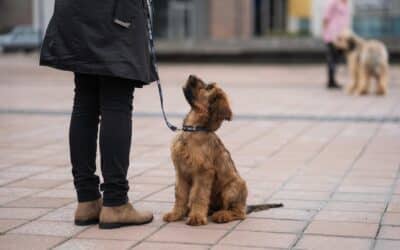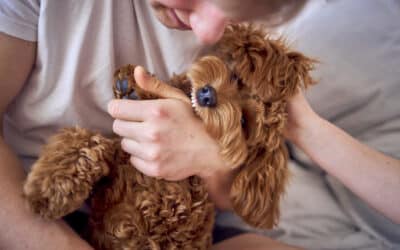During April, we launched the OneMind Dogs Puppy Hour webinar series. The aim was to help puppy owners keep up with their learning throughout a time where many of us were in isolation with our puppies during the coronavirus crisis — in particular, to help prevent puppy separation anxiety.
We had so many engaged puppy owners and even more great questions that we’re going to talk about them across a couple of posts.
Hopefully, you’ll find an answer that’s relatable to you! If not, you can always get in touch with our customer support team for personalised troubleshooting as a OneMind Dogs member.
And if you use a tip you learn in these posts, let us know how you go! We’re always excited to hear from you on our Facebook page, puppy-lovers group or our Instagram.
Puppy separation anxiety and being left alone
We had plenty of questions on this topic (it was the theme of our second webinar after all) and for good reason too.
Having a puppy in 2020 is tricky. Hell, having a puppy at any time is tricky. But right now when we’re able to be at home all the time, it’s a challenge to help your puppy understand that it’s okay (and even fun!) to be alone.
How long should you start with alone time?
Small. Tiny. Baby steps.
When you’re starting to train the puppy to be alone, start with as little as a couple of minutes. Practice the same routine you’d do if you were actually leaving, but just leave for a minute or two. You can stand just behind the front door, for example, or get into the car and drive down the street before returning.
It’s all about making the act of leaving as normal as possible for your puppy. Then, when they’re comfortable with being alone for a few minutes, gradually increase the length of time.
My puppy jumps on us and barks non-stop when we try to leave
We had a couple of people mention that their puppies are jumping up at them, barking and starting to become destructive as they’re trying to leave.
Something you can do here is to distract your puppy with something awesome while you’re gone — a delicious bully stick, a frozen kong or their favourite toy. Keep their attention off you and keep your attention off them too — it’s essential to not make a fuss as you leave or arrive.
How can I help my dog feel happier when I go back to work in a few weeks?
This is a super proactive question. Awesome stuff!
You can help your dog feel happier when you’re gone more often by starting the process earlier. If you’re going back to the office in a few weeks, start now!
Leave your buddy in their area while you work in another room, head to the grocery store or go out for a walk on your own. Also, make sure to provide them with enrichment activities like snuffle mats, kongs, and other brain-training toys.
My puppy scratches pillows, blankets, and the edge of furniture when I leave
When your puppy is home alone, they must have their own, safe space to calm down, relax, and enjoy their time in. For many dogs, this is a crate! And for others, it’s a small room or area created with baby-gates or a playpen.
If your puppy has access to the whole home or even the entire living room, the size of the space could be too overwhelming for them — driving them to scratch at or destroy furniture, blankets and pillows.
My puppy cries and is destructive when we put him in the crate
This was another popular one — with some puppies even needing ‘extra-strong crates’ because of excessive digging and showing signs of anxious behaviour like chewing fur off their paws.
If we think about this from your puppy’s point of view, it makes sense.
The human left me, I’m in this place I don’t like, and I can’t get out.
I’d be upset if someone locked me in my closet without snacks and a good book to read, at least.
So with this, it’s all about getting your puppy to enjoy being in their crate! It’s one of the first things we begin learning about in Puppy Training by OneMind Dogs.
Some simple tips for crate training:
That being said, if your puppy’s behaviour is escalating (like chewing the paws), it could be helpful to speak to a vet or animal behavior therapist.
- Feed your puppy its meals inside the crate (and leave them alone while you do so)
- Only give them their exciting chews and bones in the crate
- Encourage them to play with their favourite toy in there
- When you’re starting out, don’t close the gate. Sit with your puppy and praise them with pats and treats while they stay in the crate
- From there, gradually increase the distance between you and the crate, then finally start closing the crate for short amounts of time
The bottom line is: dogs are dogs. They do cry, bark and howl from time to time. If your dog is showing these behaviours, it doesn’t strictly mean they have puppy separation anxiety — these are all behaviours displayed by dogs who don’t yet know how to be alone. And according to my puppy, sometimes things just accidentally explode.
But, like any other behavior, with enough patience, kindness and perseverance, you’ll get there.
Need help training your puppy? Start your 7-day free trial of Puppy Training by OneMind Dogs below!




